银川海派英语:托福阅读-“纯素食主义”的风险
是否应该实行素食主义-英语辩论

背景1)There are many types of vegetarians.Vegetarians, by today’s definition, are individuals who do not eat meat, and other animal products, such as cheese and yogurt and any part of the egg.2)Reasons of being vegetarians for the present vegetarians: most vegetarians avoid animal products because of health issues(obesity,Diabetes), cultural or religious reasons.3)The battle between vegetarians and non-vegetarians has a long history. And the number of the vegetarians is increasing in today’s society. A study shows shocking results: vegetarian men reduced their risk of early death by 50%! Women vegetarians benefit from a 30% reduction in death.四辩稿Let’s go straight to the point. What the other team has been emphasizing is they believe that vegetarianism is a healthier lifestyle than a normal diet. According to their view, meats have been condemned for the trend to heart disease and various cancers. But is it really that meat causes us to be unhealthy?Chicken and fish in itself have not been shown to cause chronic diseases, but when the chicken and fish are deep fried in partially hydrogenated oil, they become one of the most potent causes of heart disease as they then contain trans fatty acids.The truth of the matter is, food processing and various artificial ingredients, what’s more, the amount of salt, are much more likely to be contributing to health detriments than a healthful steak or lamb shank. While everyone believes meats and dairies have become unhealthy, the truth is quite the opposite. Meat consumption can actually lead to a decreased risk of various medical conditions and can help to maintain weight. So what really harms is the processing of meat, not the meat itself. Secondly, the other team has always mentioned that we can supplement the nutrients with other vegetarian foods. Well, it’s not impossible, but is it really easy to do that? For example, if we need protein, we can eat more beans to supplement the protein, but eating more beans will also bring side effects such as rickets and gall- stone. In fact, eating too much specific kind of food for a long time will bring certain health risks. What we really need is a balanced diet, especially for college students. Teenagers need more nutrition to keep normal development. And most of the nutrition come from some microelements, which are rich in meat but fewer in vegetables. When we can eat meat directly to get these nutrients, why do we have to waste time looking for other foods to replace the meat when we still don’t know its side effects.Thirdly, the other team also believe that vegetarianism is on behalf of kind of sympathy for animals. They believe that animals have lives ,then what about the plants? They can kill or eat plants casually, what about the lives of plants? Do they think animal life is nobler than plants? According to the natural selection, some of the creatures on the earth will inevitably become food for other creatures. Appealing in the name of sympathy for stopping eating meat is too hypocritical. If so, I believe that there is nothing in the world that we can eat because everything has lives just in different ways. The difference between our human beings and other animals lies in our feelings and wisdom. Human will begin to pursue spiritual progress after already meeting our basic survival needs. This is the development trend of human civilization. Therefore, it is our consistent opinion to treat animals in a humanitarian, gentle manner. We agree that animal feeding conditions and slaughter conditions should be improved to reduce animal suffering, but we don’t think we can give up eating meat just because of so-called sympathy for animals.What’s more, If everyone becomes a vegetarian, the fish-farmer and pig or cattle raisers will lose their jobs, because people no longer need fish, pork, beef and other kind of meat. No meat life will make many industries disappear, such as animal husbandry, breeding industry, food processing industry and even many catering services. All these industries will go bankrupt and it will bring massive loss to the economy of the country. Some people will say that we can use the production of vegetarian products to fill the gaps in these positions but they have overlooked how large the scale of the meat industry chain is.In summary, vegetarianism is not really worthy of our promotion. Everyone can choose the eating diet they like, but when we want to promote it as a healthy lifestyle, it needs more science evidence to support. It isclear that vegetarianism doesn’t have enough. Our college students, because of shallow experience, we are a group that is more impulsive and blindly follow the trend. It is obviously not a mature decision to advocate vegetarianism for this group.1.肉类不一定致癌Meat Probably Doesn't Cause CancerOne of the most touted reasons to steer clear of meats — particularly those high in saturated fats — is the alleged increased risk of cancer and heart disease. Not only were cases of cancer, heart disease, AND obesity much lower during decades like the 1950s — where meat was a staple of every mealtime — recent research has shown that both saturated fat and cholesterol actually pose benefits to the body. According to Authority Nutrition, cholesterol is an essential molecule and yes that includes both HDL (or "good cholesterol") and LDL (otherwise known as "bad cholesterol"). "When we get a lot of cholesterol from the diet, the liver just produces less of it instead, so the total amount doesn't change much. In fact, in about 70% of people, cholesterol has negligible effects on cholesterol in he blood. In the other 30% (termed hyper-responders), there is a mild elevation in LDL cholesterol, but HDL (which is protective) also goes up." Authority Nutrition goes on to note that saturated fats can be beneficial by "decreasing risk of stroke" and results from studies and data collection have aggregated to show that saturated fats do not have an impact on cancer risks and heart disease.2.Don't oppose carnivorism and vegetarianism. Isn't it veganism must be carnivorous? We do not advocate eating meat every day, but we do not advocate eating meat at all.3.Bad for some special group of people, like teenagers and the sports men.1)Teenagers need more nutrition to keep normal development. And most of the nutrition comefrom some microelements, which are rich in meat but fewer in vegetables. And lacking of those microelements is bad for the normal growth and development of the teenagers.2)The sports lovers do a lot of physical exercises, so they need more energy than ordinary people.And meat will provide a great deal of calories that the sportsmen needed. However, vegetables can not provide so many nutrition for these people who need a lot of energy in a short time. 4.Vegetarianism Does Not Necessarily Help With Weight Loss素食主义并不有助于减肥Many people have taken to vegetarianism not for political reasons, but for weight loss reasons, as vegetarianism has been touted as a great weight loss regimen. This is not necessarily the case. In fact vegetarianism can actually lead to weight gain.The reality is that you don't necessarily have to be healthy to be a vegetarian. You just have to exclude meat (and dairy as well if you are a vegan). My ex boyfriend the vegetarian had a steady diet of vodka, tofurkey, hash browns, and Oreos (which are completely vegan, by the way) to support his vegetarian lifestyle. In other words, he wasn't in the best of health. Vegetarianism and veganism do not provide the same satiation that a diet including meat does. Because meats provide complete proteins as well as fat, you will feel fuller longer. In fact, met actually can aid in a weight-loss program and even expedite benefits gained during exercise. According to Men's Health, "When you eat, your body has to expend calories to digest the food. Protein causes this inner fire to burn the hottest, followed by carbohydrates, followed by fat. Animal proteins increase thermogenesis more than vegetable proteins, so the best calorie-burning foods are lean meats. So eat some protein at each meal—build your dinner around lean chicken, beef, or pork. That way, you're burning the most calories through digestion at the end of the day, when your metabolism is slower."5.Not Eating Meat Is Bad For The EnvironmentI can empathize with those who are put off by the idea of eating meat due to both their love of animals, and the abhorrent conditions of some (some not all) farming industries. The fact of the matter is, however, notonly do we currently have a choice of selecting meats and dairy products that are from farming industries that allow "free-range" and do not include the use of hormones or GMOs, but to eschew killing cattle for meat production would actually be detrimental to our environment. Yes, that's right, the methane produced from livestock is more potent than the deadly gas known as carbon monoxide. Moreover, soy and tofu products have always been regaled in vegetarianism (I don't know if there's a single person that orders tofu without a self-important grin plastering their face. Hey, I've been guilty of it myself) but tofu production actually exacerbates environmental harm. According to a study from Cranfield University, "Switching from British-bred beef and lamb to meat substitutes imported from abroad such as tofu and Quorn would increase the amount of land cultivated, raising the risk of forests being destroyed…The researchers concluded: ‘A switch from beef and milk to highly refined livestock product analogues such as tofu could actually increase the quantity of arable land needed to supply the UK.'"。
健康的素食主义:素食的利与弊

健康的素食主义:素食的利与弊素食主义是一种不食用任何来源于动物的食物的饮食习惯。
近年来,越来越多的人开始转向素食主义,这一趋势在全球范围内逐渐增强。
本文将探讨素食主义的利与弊,并分步骤详细介绍如何健康地实践素食主义。
一、素食主义的利1.健康益处:素食主义者往往摄入更多的蔬菜、水果、全谷类、豆类和坚果,从而获得更多的纤维、维生素、矿物质和抗氧化剂。
这有助于降低患心脏病、高血压、肥胖和某些癌症的风险。
2.环境保护:畜牧业是导致全球温室气体排放的主要原因之一。
通过选择素食,个人可以减少对资源的需求,尤其是水和土地。
此外,蔬菜和水果的生产通常会产生较少的排污和土地破坏。
3. 动物保护:素食主义者选择不食用动物制品,这种消费方式有助于减少在畜牧业中对动物的剥削和不人道待遇。
这也与伦理价值观和动物权益保护相关。
二、素食主义的弊1.营养不全面:素食排除了肉类、鱼、奶制品和蛋类等重要的营养来源,例如优质蛋白质和维生素B12。
其导致素食主义者可能面临缺乏某些重要营养素的风险,如铁、钙、锌和维生素D等。
2.食物选择受限:素食主义者在选择餐馆、社交场合和旅行等方面可能受到限制。
非素食的选项可能较为有限,且适应性不足,尤其是在一些文化和地理环境中。
3. 社会压力:素食主义在某些社会群体中仍然被视为一种相对较少接受的饮食方式。
可能会面临来自家庭、朋友或同事的社会压力和不解,这可能导致心理困扰和沮丧感。
三、健康素食主义的实践1.规划饮食:为了确保获得全面的营养,素食主义者需要选择多样化的食物来源。
每餐应包括谷物、豆类、蔬菜、水果和坚果等。
2.多样蔬果:摄入色彩丰富的蔬菜和水果,以确保获得丰富的维生素和矿物质。
不同颜色的蔬果提供不同的营养成分,例如胡萝卜红色素有助于维持良好的视力。
3.合理搭配:蛋白质是人体正常运转所必需的,素食主义者可以通过摄入豆类、坚果和谷物等多种植物性食物来补充优质蛋白质。
4. 补充营养素:对于一些难以从素食中获得的营养素,如维生素B12,素食主义者应考虑通过补充剂或者选用经过强化的食品来保证摄取。
银川海派雅思写作题目分析之素食主义
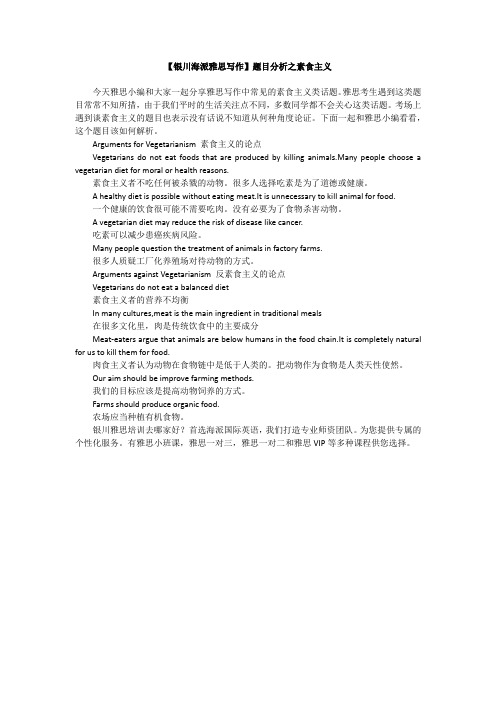
【银川海派雅思写作】题目分析之素食主义今天雅思小编和大家一起分享雅思写作中常见的素食主义类话题。
雅思考生遇到这类题目常常不知所措,由于我们平时的生活关注点不同,多数同学都不会关心这类话题。
考场上遇到谈素食主义的题目也表示没有话说不知道从何种角度论证。
下面一起和雅思小编看看,这个题目该如何解析。
Arguments for Vegetarianism 素食主义的论点Vegetarians do not eat foods that are produced by killing animals.Many people choose a vegetarian diet for moral or health reasons.素食主义者不吃任何被杀戮的动物。
很多人选择吃素是为了道德或健康。
A healthy diet is possible without eating meat.It is unnecessary to kill animal for food.一个健康的饮食很可能不需要吃肉。
没有必要为了食物杀害动物。
A vegetarian diet may reduce the risk of disease like cancer.吃素可以减少患癌疾病风险。
Many people question the treatment of animals in factory farms.很多人质疑工厂化养殖场对待动物的方式。
Arguments against Vegetarianism 反素食主义的论点Vegetarians do not eat a balanced diet素食主义者的营养不均衡In many cultures,meat is the main ingredient in traditional meals在很多文化里,肉是传统饮食中的主要成分Meat-eaters argue that animals are below humans in the food chain.It is completely natural for us to kill them for food.肉食主义者认为动物在食物链中是低于人类的。
素食主义者的利弊英语作文
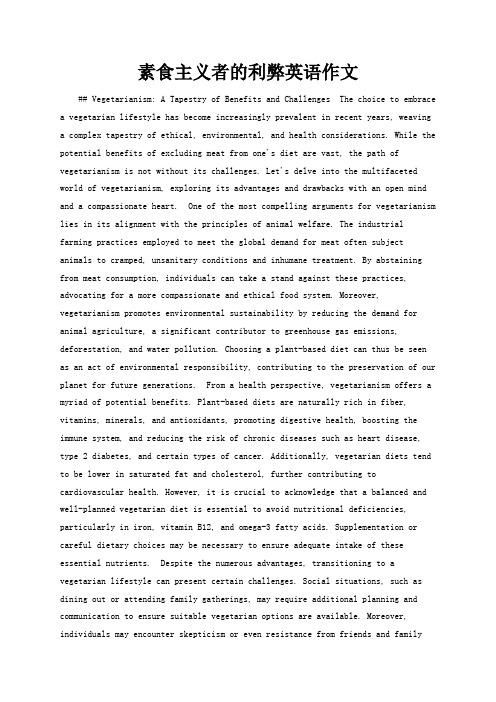
素食主义者的利弊英语作文## Vegetarianism: A Tapestry of Benefits and Challenges The choice to embrace a vegetarian lifestyle has become increasingly prevalent in recent years, weaving a complex tapestry of ethical, environmental, and health considerations. While the potential benefits of excluding meat from one's diet are vast, the path of vegetarianism is not without its challenges. Let's delve into the multifaceted world of vegetarianism, exploring its advantages and drawbacks with an open mind and a compassionate heart. One of the most compelling arguments for vegetarianism lies in its alignment with the principles of animal welfare. The industrial farming practices employed to meet the global demand for meat often subject animals to cramped, unsanitary conditions and inhumane treatment. By abstaining from meat consumption, individuals can take a stand against these practices, advocating for a more compassionate and ethical food system. Moreover, vegetarianism promotes environmental sustainability by reducing the demand for animal agriculture, a significant contributor to greenhouse gas emissions, deforestation, and water pollution. Choosing a plant-based diet can thus be seen as an act of environmental responsibility, contributing to the preservation of our planet for future generations. From a health perspective, vegetarianism offers a myriad of potential benefits. Plant-based diets are naturally rich in fiber, vitamins, minerals, and antioxidants, promoting digestive health, boosting the immune system, and reducing the risk of chronic diseases such as heart disease, type 2 diabetes, and certain types of cancer. Additionally, vegetarian diets tend to be lower in saturated fat and cholesterol, further contributing to cardiovascular health. However, it is crucial to acknowledge that a balanced and well-planned vegetarian diet is essential to avoid nutritional deficiencies, particularly in iron, vitamin B12, and omega-3 fatty acids. Supplementation or careful dietary choices may be necessary to ensure adequate intake of these essential nutrients. Despite the numerous advantages, transitioning to a vegetarian lifestyle can present certain challenges. Social situations, such as dining out or attending family gatherings, may require additional planning and communication to ensure suitable vegetarian options are available. Moreover, individuals may encounter skepticism or even resistance from friends and familymembers who may not understand or agree with their dietary choices. Overcoming these social obstacles requires patience, open communication, and a willingness to educate others about the reasons behind one's vegetarian lifestyle. Furthermore, navigating the world of food labels and ingredient lists can be a daunting taskfor new vegetarians. Hidden animal-derived ingredients, such as gelatin or rennet, can lurk in seemingly vegetarian products, necessitating careful scrutiny. Fortunately, a plethora of resources, including vegetarian cookbooks, online communities, and mobile apps, are readily available to support individuals ontheir vegetarian journey. These resources provide guidance on meal planning, recipe ideas, and navigating social situations, making the transition to a vegetarian lifestyle smoother and more enjoyable. Ultimately, the decision to embrace vegetarianism is a personal one, shaped by individual values, beliefs, and circumstances. By weighing the benefits and challenges, individuals can make informed choices that align with their ethical, environmental, and health goals. Whether motivated by compassion for animals, concern for the environment, or a desire for improved health, vegetarianism offers a path towards a more conscious and sustainable way of living.。
素食主义者的利弊英语作文

素食主义者的利弊英语作文英文回答:Vegetarianism: Pros and Cons.Vegetarianism, the practice of abstaining from eating meat, has gained significant popularity in recent years. While it offers numerous potential benefits, it also comes with certain considerations.Pros:Improved Health: Vegetarian diets are typically rich in fruits, vegetables, and whole grains, which provide essential nutrients, antioxidants, and fiber. Studies have linked vegetarianism to a reduced risk of heart disease, stroke, type 2 diabetes, and certain types of cancer.Animal Welfare: Vegetarianism aligns with ethical concerns regarding the treatment of animals in factoryfarms. By choosing a meat-free diet, individuals can reduce their contribution to animal suffering.Environmental Sustainability: Meat production has a significant impact on the environment in terms of greenhouse gas emissions, water consumption, and deforestation. Opting for vegetarianism can mitigate these environmental concerns.Cons:Nutrient Deficiencies: Certain nutrients, such as vitamin B12, iron, calcium, and zinc, are more readily absorbed from animal products. Vegetarians need to plan their diets carefully to ensure adequate intake of these nutrients.Social Challenges: Social norms and dining customs can sometimes present challenges for vegetarians. They may face limited meal options at social gatherings or experience pressure to consume meat.Cost: Vegetarian diets can be more expensive than meat-based diets, particularly if organic and whole food options are prioritized.Additional Considerations:Types of Vegetarianism: There are various types of vegetarianism, including lacto-vegetarianism (consuming dairy products), ovo-vegetarianism (consuming eggs), and veganism (excluding all animal products).Health Conditions: Individuals with certain health conditions may need to consult with a healthcare professional before adopting a vegetarian diet.Personal Preferences: Ultimately, the decision to adopt a vegetarian diet is a personal one. It's important to weigh the potential benefits and challenges based on individual circumstances and preferences.中文回答:素食主义的利弊。
素食主义的利弊

素食主义的利弊在现代生活中,提倡素食的人越来越多了。
有人素食,是为了宗教的需要而吃素,更多的人则是为了健康,还有人是二者兼顾,一举两得。
其实,素食的好处是很多的,概括起来,至少具有下列十大益处。
下面就由店铺为大家整理的吃素食的利弊,欢迎阅读。
一、能益寿延年根据营养学家研究证明,素食者比非素食者更能长命。
巴基斯坦北部的浑匝人和墨西哥中部的印第安人,都是原始的素食主义民族,平均寿命极高。
令人称羡。
佛教的僧、__复临安息日会教友,也因素食而享高寿。
二、可减轻体重素食者比较肉食者,一般来说的体重较轻,这是因为所揖取动物脂肪较少,可有效地减少不必要的赘肉之故。
体轻则减负也。
三、能降低胆固醇含量素食者血液中所含的胆固醇永远比肉食者要少,血液中胆固醇含量如果太多,则往往会造成血管阻塞,成为高血压,心脏病等病症的主因。
四、减少患癌症机会某些研究指出,肉食与结肠癌有相当密切的关系。
实践证明:素食者与肉食者相比较,前者患癌症的机率要少的很多。
五、减少寄生虫对人体的侵害条虫及其他好几种寄生虫,都是经由受感染的肉类而辗转寄生到人体上的。
素食者吃的大部份是植物食品,其寄生虫比肉类食物要少的很多。
六、减少对肾脏的负担各种高等动物和人体内的废物,经由血液带至肾脏。
肉食者所食用的肉类中,一旦含有动物血液而带入肾脏时,就会加重对肾脏的负担。
素食者避开了肉食,由此而减轻了对肾脏的负担。
七、易于储藏植物性蛋白质通常比动物性的蛋白质更易于储存。
由于储存期的差距,可减少霉腐食物入侵人体,以提高人们的健康水平。
八、价格低廉,可降低生活成本植物性蛋白质比肉类便宜,这样可以降低人的生活成本。
九、合乎生态原理生产一磅牛肉所需的土地,可生产十磅的植物性蛋白质。
许多生态学家预言,人口爆炸将迫使全世界不得不吃素。
大量动物的捕杀,使大自然生态失去平衡,提倡素食完全合乎生态平衡原理。
十、饮食富于变化素食的家庭主妇往往发现,利用植物性蛋白质,比利用一般肉类更能烧出色香味俱佳的菜肴,而制作方法也富于变化,更能引起良好的食欲。
为什么越来越多的人选择素食主义?

为什么越来越多的人选择素食主义?随着社会的进步和人们对健康意识的增强,越来越多的人开始选择素食主义。
究竟是什么原因导致了这一趋势的形成?本文将从健康、环保和道德三方面阐述为什么越来越多的人选择素食主义。
健康1.素食有助于降低心脏病、中风等慢性疾病的风险。
研究表明,素食主义者较少患有高血压、高胆固醇等疾病。
2.通过平衡膳食,素食主义者可以获得足够的营养,同时避免了肉类等食品所带来的致癌物质和细菌感染的风险。
3.素食还能够带来更好的体型。
婴儿和儿童时期的素食就能够避免肥胖和超重,素食主义者的平均体重也一般比非素食主义者更低。
环保1.肉类消耗了大量的资源,包括饲料、水和土地。
从生产中到运输销售,各个环节都会释放出大量的温室气体,这对环境造成了很大的危害。
2.畜牧业的废水和废弃物会产生有害的气味和污染,对周围的环境造成很大的伤害。
而素食主义者不需要支持这种行业,也能对环境产生积极的影响。
3.效率低下的畜牧业对全球粮食供应链也产生了负面影响。
为了养活一个肉食品的动物,需要大量的饲料,同时听从这种需求也会占用大量的领土和水源。
道德1.有一些人认为要避免杀戮和非人类动物的苦难,就需要避免食用肉类和其他动物制品。
2.有些人选择素食主义是出于对动物的尊重。
带着一个健康保健的心态,身体是神所赐,然而如果不能珍惜生命的话,那就完全没有办法再谈“保健”了。
3.有些人选择素食主义是为了避免支持残酷的动物饲养和屠宰行业。
这些行业往往对动物进行不必要的虐待和屠宰,而选择素食主义可以降低对这些行业的支持。
总结一统天下的饮食方式并不存在,不同地区,不同文化均有其独特的饮食特色和喜好,每个人的选择都应尊重。
选择素食主义并不是为了攀比或者显摆,而是基于健康、环保和道德等因素做出的理性判断。
我们可以选择坚持,也可以偶尔尝试一下纯素食,从而增进自己的健康并为未来的世界留下一份美好。
(704字)。
不会选择素食主义者的原因英语作文

不会选择素食主义者的原因英语作文英文回答:Why I Will Not Choose to Become a Vegetarian.The decision of whether or not to adopt a vegetarian lifestyle is a complex and personal one, and the reasonsfor choosing or not choosing such a diet are multifaceted. While there are certainly valid arguments in favor of vegetarianism, there are also compelling reasons why one might choose not to embrace it.Nutritional Considerations:One of the primary concerns with vegetarianism is the potential for nutritional deficiencies. While it is possible to obtain all the necessary nutrients from aplant-based diet, it requires careful planning andattention to ensure adequate intake of protein, iron, zinc, vitamin B12, and other essential nutrients. Vegetariandiets are inherently low in certain nutrients such as heme iron, vitamin D3, and creatine, making supplementation or fortified foods necessary for optimal health.Taste and Variety:For many people, taste and variety are importantfactors in dietary choices. While vegetarian cuisine can be diverse and flavorful, it does not offer the same breadth of flavors and textures as a diet that includes meat and animal products. Vegetarian meals may become monotonous and unsatisfying for those accustomed to the diverse tastes and textures of animal-derived foods.Cultural and Social Factors:Vegetarianism can pose challenges in certain cultural and social contexts. In many cuisines, meat and animal products play a central role in traditional dishes and family gatherings. Adopting a vegetarian diet can create barriers within these contexts, leading to feelings of isolation or exclusion. Additionally, dining out atrestaurants or attending social events can become more difficult, as vegetarian options may be limited or unavailable.Ethical and Environmental Concerns:While ethical and environmental concerns are oftencited as reasons for choosing vegetarianism, it is important to recognize that these concerns can be addressed through other means. Sustainable farming practices, humane animal treatment, and reducing overall meat consumption can mitigate the ethical and environmental impacts of meat production without requiring complete abstinence from animal products.Personal Preferences and Values:Ultimately, the decision of whether or not to become a vegetarian is a matter of personal preferences and values. There is no inherently right or wrong choice, and each individual must weigh the potential benefits and drawbacks to determine what is best for them. For some, the ethicaland environmental concerns may outweigh the nutritional and social challenges, while for others, the trade-offs may not be worth it.中文回答:我不会选择素食主义的原因。
素食的优点和风险 如何素食才更健康

素食的优点和风险如何素食才更健康来自:腾讯网1天前| 阅读原文全素主义:优点VS风险就素食来看,这种相对有欠缺的饮食结构很可能会造成人体营养素供给的不均衡。
专家说,素食又分为全素食(即完全以植物性食物及其制品为食)和乳蛋素食(除植物性食物及其制品外,还可选择蛋类、乳制品)。
“比较起来,乳蛋素食的膳食营养更为全面,而全素食则更容易造成某些身体必需营养素的严重缺位。
”素食优点:素食食材的脂肪含量普遍特别少,基本不含胆固醇,的确能有效减少心血管疾病发生的可能性;此外,素食的纤维素含量非常充足,可以带走身体内部分毒素;多吃青菜水果还能有助于防止肿瘤发生,有利养生。
素食风险:摄入更多的植物性食物意味着相对更为丰富的水溶性维生素和膳食纤维、更少的饱和脂肪酸和胆固醇,也会带来一些营养素缺乏的高危因素:优质蛋白的摄入减少、植物性食物中的钙的吸收率低,再加上膳食纤维及植酸对营养素吸收的干扰,很容易造成微量营养素如维生素、微量元素的缺乏,如钙、铁、锌、硒及维生素A、D、B12等。
另外,患有肝、肾疾病的人也不适合食素,尤其是尿毒症患者,素食会导致钾的摄入过多,而优质蛋白质的摄入堪忧。
专家表示,如果选择“全素食”,日常连鸡蛋、牛奶、鱼都不碰,此以往对身体的隐形伤害可能更大。
毕竟人体所必需的氨基酸有很多来自肉类,而且很多偏偏还来自被不少人所讨厌的肥肉,但是这些氨基酸对保证人体免疫力维持在较好水平、以及保障内分泌代谢正常,都起着很重要的作用。
它的长期缺位,可能引起营养不良、结石、缺钙贫血等一系列反应,甚至会产生不可逆的伤害,还可能影响女性的月经、生育能力等。
此外,准妈妈和刚当妈妈的女性也最好暂时放弃“全素食”,因为母乳中含有供孩子生长的大量脂肪和蛋白质,如果素食,会导致乳汁脂肪含量下降,蛋白质质量也会变差。
专家支招素食者如何保持营养均衡如果坚持将“素食主义”进行到底,在饮食中应注意什么才能尽量保证身体营养均衡?专家给出了如下几条意见:应注意增加餐次以保证摄入充足的热量,从而保障人体有精力开展正常的思维和活动。
浅析素食的利弊
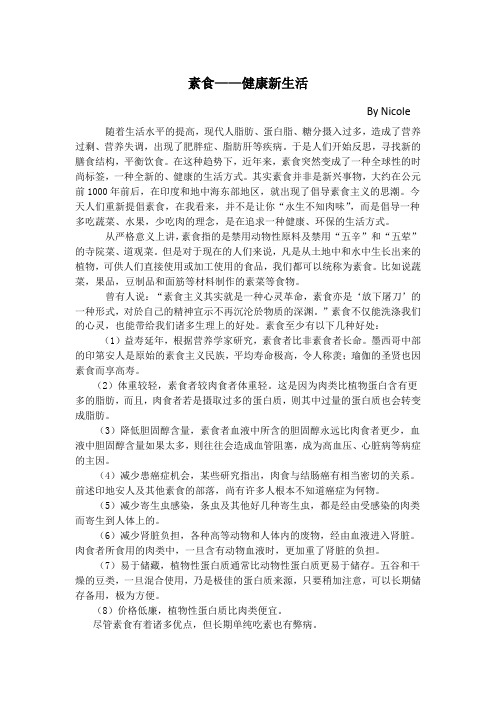
素食——健康新生活By Nicole 随着生活水平的提高,现代人脂肪、蛋白脂、糖分摄入过多,造成了营养过剩、营养失调,出现了肥胖症、脂肪肝等疾病。
于是人们开始反思,寻找新的膳食结构,平衡饮食。
在这种趋势下,近年来,素食突然变成了一种全球性的时尚标签,一种全新的、健康的生活方式。
其实素食并非是新兴事物,大约在公元前1000年前后,在印度和地中海东部地区,就出现了倡导素食主义的思潮。
今天人们重新提倡素食,在我看来,并不是让你“永生不知肉味”,而是倡导一种多吃蔬菜、水果,少吃肉的理念,是在追求一种健康、环保的生活方式。
从严格意义上讲,素食指的是禁用动物性原料及禁用“五辛”和“五荤”的寺院菜、道观菜。
但是对于现在的人们来说,凡是从土地中和水中生长出来的植物,可供人们直接使用或加工使用的食品,我们都可以统称为素食。
比如说蔬菜,果品,豆制品和面筋等材料制作的素菜等食物。
曾有人说:“素食主义其实就是一种心灵革命,素食亦是‘放下屠刀’的一种形式,对於自己的精神宣示不再沉沦於物质的深渊。
”素食不仅能洗涤我们的心灵,也能带给我们诸多生理上的好处。
素食至少有以下几种好处:(1)益寿延年,根据营养学家研究,素食者比非素食者长命。
墨西哥中部的印第安人是原始的素食主义民族,平均寿命极高,令人称羡;瑜伽的圣贤也因素食而享高寿。
(2)体重较轻,素食者较肉食者体重轻。
这是因为肉类比植物蛋白含有更多的脂肪,而且,肉食者若是摄取过多的蛋白质,则其中过量的蛋白质也会转变成脂肪。
(3)降低胆固醇含量,素食者血液中所含的胆固醇永远比肉食者更少,血液中胆固醇含量如果太多,则往往会造成血管阻塞,成为高血压、心脏病等病症的主因。
(4)减少患癌症机会,某些研究指出,肉食与结肠癌有相当密切的关系。
前述印地安人及其他素食的部落,尚有许多人根本不知道癌症为何物。
(5)减少寄生虫感染,条虫及其他好几种寄生虫,都是经由受感染的肉类而寄生到人体上的。
(6)减少肾脏负担,各种高等动物和人体内的废物,经由血液进入肾脏。
常吃素食身体好,但纯吃素食健康风险高
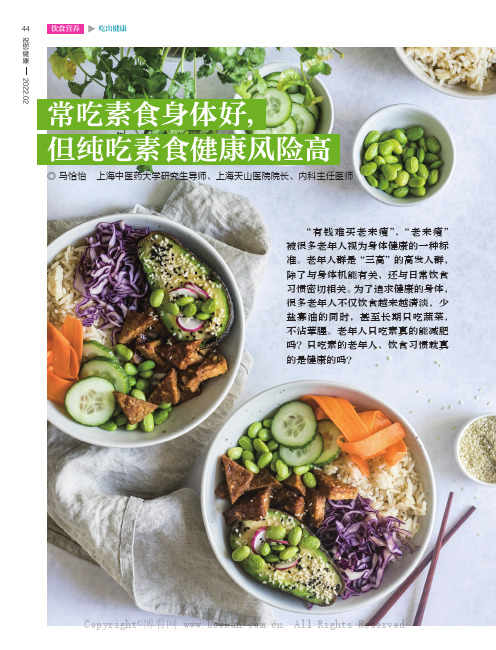
2022.0244祝您健康吃出健康“有钱难买老来瘦”,“老来瘦”被很多老年人视为身体健康的一种标准。
老年人群是“三高”的高发人群,除了与身体机能有关,还与日常饮食习惯密切相关。
为了追求健康的身体,很多老年人不仅饮食越来越清淡,少盐寡油的同时,甚至长期只吃蔬菜,不沾荤腥。
老年人只吃素真的能减肥吗?只吃素的老年人,饮食习惯就真的是健康的吗?◎ 马恰怡 上海中医药大学研究生导师、上海天山医院院长、内科主任医师常吃素食身体好,但纯吃素食健康风险高2022.0245祝您健康吃出健康◎ 造成肥胖的原因并不都和吃有关遗传因素和个体代谢差异是导致肥胖体型的主要原因。
有研究表明,受精卵形成的时候,准父母中一人或者两人都是超重或肥胖状态,孩子将来的体型很难属于瘦削型;妈妈在孕期有妊娠糖耐量异常或妊娠糖尿病、孕期体重增加超标很多等“娘胎”里的原因,注定有些孩子天生就是“小胖墩”。
不同人体内,涉及不同营养素消化吸收代谢的某些酶的分泌量,会因为遗传基础或疾病等原因的影响而有差异,比如某些双糖酶、脂肪酶等。
举个例子:有人乳糖酶缺乏,有人不缺,对缺乏的人而言,牛奶中的乳糖就不能吸收,也就不会有乳糖的热量获得。
还有甲状腺素、肾上腺素、雄性激素、胰岛素等分泌的差异,也会影响到体型,比如甲状腺功能亢进症患者就是高代谢典型,而甲状腺功能减退症就相反。
包括年龄因素,中老年人会适度发福,这是正常现象。
◎ 素食并非都是低热量很多人都有这样一个认识的误区,以为没有了动物性食物、远离了来自肉蛋奶的脂肪,就逃离了致胖风险。
但现实情况却是,很多素食食物或食品为了增加口感,添加了过多油盐糖类调料,薯片、薯条、油饼、油条、油炸糕、油炒饭、炸洋芋、酱爆茄子、油炸年糕、油炸豆腐、炸素饺子、炸素丸子、炸馒头片、素冰淇淋、素油糕点、烤面筋、高糖食物及饮料、高素油的其他食品及调料(比如芝麻酱、辣椒油等)……如果你爱上了这些美味,想不胖都难。
◎ 素食加工最易因“过油”而致肥素食以蔬菜为主,这些食物本身脂肪少、热量低、口感比较差,为了让蔬菜吃起来更加美味,人们在烹饪蔬菜时常会添加大量的油盐,这样一来,就摄入了大量高热量的脂肪。
素食主义者利弊的英语作文
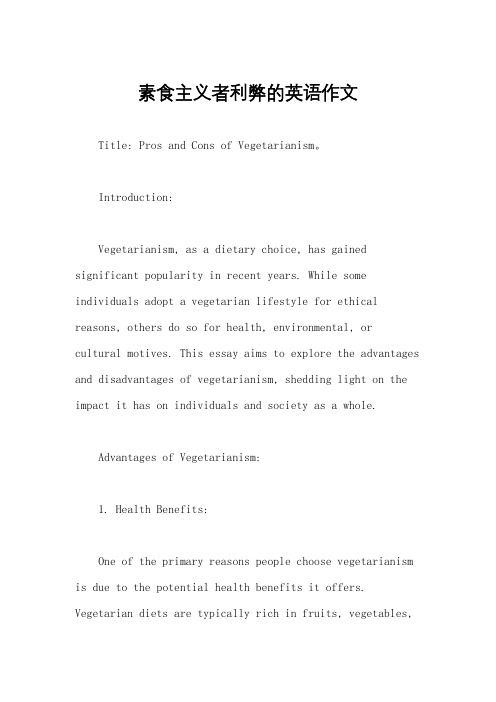
素食主义者利弊的英语作文Title: Pros and Cons of Vegetarianism。
Introduction:Vegetarianism, as a dietary choice, has gained significant popularity in recent years. While some individuals adopt a vegetarian lifestyle for ethical reasons, others do so for health, environmental, orcultural motives. This essay aims to explore the advantages and disadvantages of vegetarianism, shedding light on the impact it has on individuals and society as a whole.Advantages of Vegetarianism:1. Health Benefits:One of the primary reasons people choose vegetarianism is due to the potential health benefits it offers. Vegetarian diets are typically rich in fruits, vegetables,whole grains, legumes, and nuts, providing essential nutrients, vitamins, and minerals. Research suggests that vegetarians may have a lower risk of developing chronic diseases such as heart disease, obesity, type 2 diabetes, and certain types of cancer. Additionally, vegetarian diets tend to be lower in saturated fats and cholesterol, promoting overall well-being.2. Environmental Sustainability:The environmental impact of meat production is a growing concern. Livestock farming contributessignificantly to greenhouse gas emissions, deforestation, water pollution, and depletion of natural resources. By adopting a vegetarian lifestyle, individuals can contribute to reducing their carbon footprint and preserving the planet. Plant-based diets require fewer resources, such as water and land, and produce fewer greenhouse gas emissions, making them more sustainable and environmentally friendly.3. Ethical Considerations:Many vegetarians choose their dietary preference based on ethical concerns related to animal welfare. They argue that animals raised for food often endure inhumane conditions, cramped spaces, and suffer from painful practices such as debeaking, tail docking, and castration without anesthesia. By abstaining from consuming meat, vegetarians aim to reduce animal suffering and promote compassion towards all living beings.4. Cultural and Religious Beliefs:Vegetarianism is deeply rooted in various cultural and religious traditions. For example, Hinduism promotes vegetarianism as it emphasizes non-violence and respect for all forms of life. Similarly, Buddhism encourages followers to abstain from consuming meat to cultivate compassion and avoid harming sentient beings. By adhering to thesecultural or religious beliefs, individuals find a sense of connection and spiritual fulfillment.Disadvantages of Vegetarianism:1. Nutritional Deficiencies:While a well-planned vegetarian diet can provide all necessary nutrients, there is a risk of certaindeficiencies if not carefully managed. Some essential nutrients, such as vitamin B12, iron, zinc, omega-3 fatty acids, and calcium, are predominantly found in animal-based products. Vegetarians need to ensure they include alternative sources of these nutrients in their diet, such as fortified foods, supplements, or plant-based sourceslike legumes, nuts, and seeds.2. Social Challenges:Vegetarians may face social challenges, particularly in societies where meat consumption is deeply ingrained in cultural practices and traditions. Attending social gatherings, family events, or dining out can become challenging as vegetarian options may be limited or not available. This can lead to feelings of isolation, inconvenience, and difficulty in maintaining a consistent vegetarian lifestyle.3. Increased Meal Planning:Adopting a vegetarian diet often requires more conscious meal planning and preparation. Unlike omnivorous diets, which offer a wider range of food options, vegetarians need to ensure they consume a balanced and varied diet to meet their nutritional needs. This may involve researching recipes, finding suitable alternatives, and dedicating more time to meal preparation.4. Limited Availability and Accessibility:In certain regions, vegetarian options may be limited, making it challenging for individuals to maintain a vegetarian lifestyle. Rural areas or countries with strong meat-based culinary traditions may have fewer vegetarian-friendly restaurants or grocery stores. This lack of availability and accessibility can make it difficult for individuals to sustain a vegetarian diet, leading to potential frustration and compromise in dietary choices.Conclusion:Vegetarianism offers various advantages, including potential health benefits, environmental sustainability, ethical considerations, and cultural or religious fulfillment. However, it is important to acknowledge the potential disadvantages, such as nutritional deficiencies, social challenges, increased meal planning, and limited availability and accessibility. Ultimately, the decision to adopt a vegetarian lifestyle should be based on personal values, individual circumstances, and a well-informed understanding of the benefits and challenges it entails.。
素食主义者的缺点英语作文
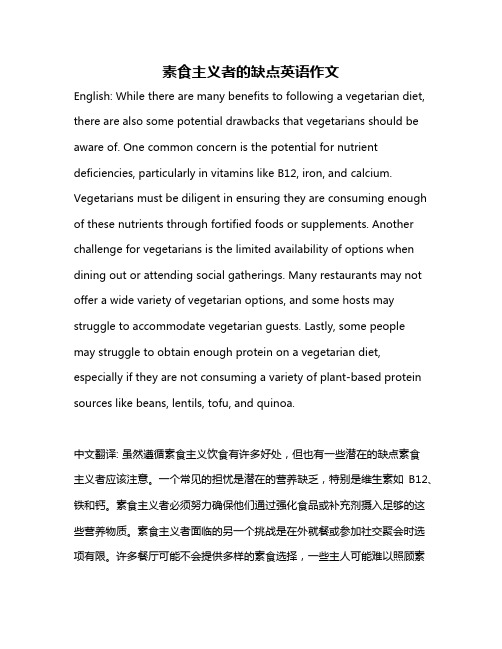
素食主义者的缺点英语作文English: While there are many benefits to following a vegetarian diet, there are also some potential drawbacks that vegetarians should be aware of. One common concern is the potential for nutrient deficiencies, particularly in vitamins like B12, iron, and calcium. Vegetarians must be diligent in ensuring they are consuming enough of these nutrients through fortified foods or supplements. Another challenge for vegetarians is the limited availability of options when dining out or attending social gatherings. Many restaurants may not offer a wide variety of vegetarian options, and some hosts may struggle to accommodate vegetarian guests. Lastly, some people may struggle to obtain enough protein on a vegetarian diet, especially if they are not consuming a variety of plant-based protein sources like beans, lentils, tofu, and quinoa.中文翻译: 虽然遵循素食主义饮食有许多好处,但也有一些潜在的缺点素食主义者应该注意。
素食的利弊英语作文

素食的利弊英语作文素食的利弊英语作文Vegetarians are more intelligent, according to a new study.A study of thousands of men and women revealed that those who stick to a vegetarian diet have IQs that are around five points higher than those who regularly eat meat.Writing in the British Medical Journal, the researchers say it isn't clear whyveggiesare brainier - but admit the fruit and veg-rich vegetarian diet could somehow boost brain power.The researchers, from the University of Southampton, tracked the fortunes of more than 8,000 volunteers for 20 years.They found that those who were vegetarians by the age of 30 had recorded five points more on average at the age of 10.Further analysis of the results showed those who were brainiest as children were mor e likely to have become vegetarian as adults.The typical adult veggie had a childhood IQ of around 105 - around five points higher than those who continued to eat meat as they grew up.The vegetarians were also more likely to have gained degrees and hold down high-powered jobs.However, these differences were not reflected in their annual income, which was similar to that of non-vegetarians.There was no difference in IQ between strict vegetarians and those who classed themselves as veggie but still ate fish or chicken.However,vegans- vegetarians who also avoid dairy products - scored significantly lower, averaging an IQ score of 95 at the age of 10.坚持吃素食的人比经常吃肉的人智商高五分左右.这项研究结果在《英国医学期刊》上发表.研究人员称,素食者智商更高的具体原因还不清楚,但素食中丰富的'水果和蔬菜可以增强脑力.南安普顿大学的研究人员对8000多名志愿者进行了长达20年的跟踪调查.结果发现,30岁之前一直以素食为主的调查对象在10岁时的智商平均高出五分.研究人员通过进一步分析发现,智商较高的儿童成人后成为素食者的可能性较大.成年素食者在儿童时期的智商大约为105,比非素食者儿童时期的智商高五分左右.此外,素食者获得学位和担任高层职位的几率较大.但素食者和非素食者在收入方面没有什么差别.此外,严格素食者和吃鱼和鸡肉的素食者的智商水平没什么差别.但不食用奶制品的完全素食者的智商水平则要低得多,他们10岁时的平均智商只有95分。
英语考试作文-雅思写作范文及思路点拨:素食主义真的健康吗-

英语考试作文雅思写作范文及思路点拨:素食主义真的健康吗?考鸭们都知道,雅思写作话题有一个历史题库。
本文就为大家梳理历年雅思写作真题范文:Some people think everyone should be a vegetarian, because we do not need to eat meat to have a healthy diet. To what extent do you agree or disagree?——2015年9月19日生活类雅思写作真题题目讲解题目的类型属于单一观点的讨论。
话题类型属于生活方式与健康。
这道题虽然是一个观点,但是包含了两方面①人人应该成为素食主义者②我们不需要吃肉去保持健康。
根据雅思论文相对化VS 绝对化的选择,这道题在论述上选择不同意会更容易写些范文主体思路分析:主体部分反驳理由一:并不是每个人都要成为素食者,有些特殊人群必定不能只吃素食,比如生长发育期的孩子,对蔬菜过敏的人以及孕妇主体部分反驳理由二:肉类中的营养不是蔬菜能够代替的,平衡膳食最重要雅思写作参考范文 People have different views about whether being vegetarians or vegans is more beneficial for human beings. Some people believe that being a vegetarian is better since meat is helpless for people to stay healthy. I doubt this statement as people have right to choose whether to be a vegetarian or not and meat is a regular part of our diet.人们对于素食者和素食者是否对人类更有益的看法不同。
素食主义者的缺点英语作文

素食主义者的缺点英语作文English Answer:Vegetarianism, a diet that excludes meat, fish, and other animal-derived products, has gained popularity over the years due to ethical, environmental, and health concerns. While a vegetarian diet can offer certain health benefits, there are also potential drawbacks that individuals should be aware of.One of the primary concerns associated with vegetarian diets is the potential for nutrient deficiencies, particularly vitamin B12, iron, calcium, and omega-3 fatty acids. Vitamin B12, which plays a vital role in red blood cell production and nerve function, is primarily found in animal products and is not naturally present in plant-based foods. Iron, an essential mineral for red blood cell formation, is also less bioavailable in plant-based sources compared to meat. Calcium, crucial for bone health, can be obtained from dairy products, fortified plant-based milkalternatives, and leafy green vegetables, but the absorption and utilization of calcium from plant sources can be lower than from animal sources. Omega-3 fatty acids, which are important for brain and heart health, are primarily found in fatty fish and can be difficult to obtain in sufficient amounts from plant sources.Another potential issue with vegetarian diets is the difficulty in obtaining adequate protein. Protein is essential for building and repairing tissues, and while there are plant-based sources of protein, such as beans, lentils, nuts, and seeds, it can be more challenging to meet protein requirements through vegetarian diets compared to diets that include animal products. Additionally, plant-based proteins may have lower biological value, meaning they are not as efficiently absorbed and utilized by the body compared to animal-based proteins.To minimize the risks associated with vegetarian diets, individuals should ensure they are consuming anutritionally balanced and varied diet that includes a wide range of plant-based foods. Fortifying plant-based foodswith essential nutrients, such as vitamin B12 and iron, can help address nutrient deficiencies. Additionally, vegetarians can consider supplementing their diets with vitamin B12, iron, calcium, and omega-3 fatty acids to ensure adequate intake. It is also recommended for vegetarians to regularly consult with a healthcare professional or registered dietitian to monitor their nutritional status and address any potential concerns.In summary, while vegetarian diets can offer certain health benefits, there are potential drawbacks related to nutrient deficiencies and protein intake that individuals should be aware of. By ensuring a nutritionally balanced and varied diet, incorporating fortified foods, and supplementing if necessary, vegetarians can mitigate these risks and enjoy the potential benefits of a plant-based lifestyle.中文回答:素食主义的缺点。
素食主义者利弊的评论英文作文

素食主义者利弊的评论英文作文(中英文实用版)Vegetarianism has been gaining momentum in recent years, as more and more people are choosing to adopt a meat-free diet for various reasons. While there are numerous benefits to being a vegetarian, there are also some drawbacks that should be taken into consideration.素食主义近年来越来越受到关注,越来越多的人因为各种原因选择放弃肉食。
尽管成为素食主义者有很多好处,但也有一些不足之处需要我们思考。
First and foremost, one of the major advantages of vegetarianism is its positive impact on health. numerous studies have shown that a well-planned vegetarian diet can reduce the risk of heart disease, high blood pressure, and certain types of cancer. Additionally, it can lead to weight loss and improved digestion.首先,素食主义的一大优势是它对健康的积极影响。
众多研究表明,合理安排的素食饮食可以降低患心脏病、高血压和某些类型癌症的风险。
此外,它还能帮助减肥和改善消化。
However, one potential downside is the limited variety of food options available to vegetarians. This can make it challenging to obtain all the necessary nutrients, such as protein, iron, and vitamin B12, which are predominantly found in animal products.然而,一个潜在的缺点是素食者的食物选择相对有限。
素食主义者的好处和坏处英语作文

素食主义者的好处和坏处英语作文The Ups and Downs of Being a VegetarianHi there! My name is Alex, and I'm a 10-year-old kid who loves animals and cares about the environment. Today, I want to talk to you about vegetarianism – the choice to not eat meat, fish, or any products that come from animals. It's a topic that a lot of people have strong opinions about, and I'll share with you some of the good things and not-so-good things about being a vegetarian.Let's start with the awesome reasons why someone might choose to be a vegetarian:It's kind to animalsThis is probably the biggest reason why people decide to go veggie. We all know that animals raised for food often live in really cramped and dirty conditions on factory farms. They don't get to run around, play, or do the things that animals naturally do. By not eating meat, vegetarians don't support these cruel practices. It's a way of showing respect and compassion for all living creatures.It's better for the environmentRaising animals for food takes up a lot of land, water, and energy. It also produces a ton of greenhouse gases that contribute to climate change. By choosing plant-based foods instead of meat, vegetarians have a much smaller environmental footprint. They're helping to protect the planet we all share.It can be healthierA well-planned vegetarian diet is usually high in fiber, vitamins, and minerals. It can lower your risk of heart disease, diabetes, and some types of cancer. Of course, you still need to make sure you're getting all the nutrients your body needs, especially protein, iron, and vitamin B12. But with a little bit of planning, it's totally possible to be a healthy vegetarian.It's cheaperMeat is often one of the most expensive items in the grocery store. By cutting it out of your diet, you can save a lot of money. That means you'll have more cash for fun stuff, like toys, books, or video games!Those are some of the major benefits of being a vegetarian. But let's be honest, it's not all rainbows and butterflies. There are some downsides too:It can be socially challengingWhen all your friends are chowing down on burgers and hot dogs at a party, it can be hard to be the odd one out. You might feel left out or get teased for your dietary choices. It can also be tricky when you're eating out or going over to someone's house for dinner.It takes more planningBeing a vegetarian means you have to be a little more mindful about what you're eating. You can't just grab any old snack or meal – you have to make sure it doesn't contain meat, fish, or other animal products. That takes some extra effort and planning, especially when you're first starting out.You might miss your favorite foodsI'm not gonna lie – I really miss the taste of bacon sometimes. Or a juicy cheeseburger. Or my mom's famous meatballs. Giving up those familiar flavors and textures can be tough, especially if they're foods you've loved your whole life.It can be harder to get certain nutrientsAs I mentioned before, it's possible to get all the nutrients you need on a vegetarian diet, but it does take some work. Things like protein, iron, zinc, and vitamin B12 are mainly foundin animal products, so vegetarians have to be extra diligent about getting enough of those essential nutrients.So, those are some of the major pros and cons of being a vegetarian. It's a personal choice that depends on your values, lifestyle, and dietary needs. For me, the ethical and environmental reasons outweigh the challenges, but everyone has to decide what's right for them.If you are thinking about becoming a vegetarian, here are a few tips that might help:Start slowly by having one or two meat-free days a week.Explore new recipes and cuisines that feature plant-based proteins like beans, lentils, tofu, and nuts.Make sure you're getting enough iron by eating lots of leafy greens, fortified cereals, and legumes.Talk to your parents or a doctor about taking a vitamin B12 supplement.Be prepared to explain your choices to friends and family, but don't get discouraged if they don't understand at first.Connect with other vegetarians (in real life or online) for support and advice.Whether you ultimately decide to go vegetarian or not, I hope this essay has given you some food for thought (pun intended!). It's a big decision, but one that can have a positive impact on animals, the environment, and your own health.Thanks for reading, and happy eating!Word count: 2,006。
- 1、下载文档前请自行甄别文档内容的完整性,平台不提供额外的编辑、内容补充、找答案等附加服务。
- 2、"仅部分预览"的文档,不可在线预览部分如存在完整性等问题,可反馈申请退款(可完整预览的文档不适用该条件!)。
- 3、如文档侵犯您的权益,请联系客服反馈,我们会尽快为您处理(人工客服工作时间:9:00-18:30)。
银川海派英语:托福阅读-“纯素食主义”的风险
托福阅读:“纯素食主义”的风险
近几年,素食主义悄然流行,越来越多的人加入了素食者的行列。
不过,近日发布在自然母亲网络的一篇文章指出,纯素食也有潜在的健康风险,比如,纯素食者患肠癌的几率更高、骨矿物密度偏低,以及更容易缺乏维生素B12等等。
营养专家表示,加入纯素食者行列意味着你要花更多的时间来规划饮食结构以保证各类营养摄入均衡。
如果没有精力和时间详细规划,营养专家建议不妨做一个“弹性素食者”,即大部分时间吃素,偶尔吃点肉补充动物蛋白。
Thinking of giving up meat from your diet? The potential health benefits of a green diet are well established but a story by the Mother Nature Network (MNN) says there are also some potential side effects and health risks associated with a vegetarian lifestyle.
Could low cholesterol kill you? A study by the Honolulu Heart Program found that elderly people with a "low cholesterol concentration" had a "significant association with mortality." In addition a 2009 review published in the American Journal of Clinical Nutrition found that while vegetarians have an overall lower rate of cancer compared with meat eaters vegetarians do have a 39 percent higher rate of colorectal cancer.
Other health concerns associated with vegetarianism cited by MNN included lower bone mineral density and lower levels of vitamin B12. However the publishers of the bone density study said the "magnitude of the association is clinically insignificant" at just around 5 percent.
Going vegetarian appears to have gained popularity in recent years. A recent Yahoo Sports article even examined the diet of Mixed Martial Arts (MMA) fighter Jake Shields. Though much of the media's focus has been on a worldwide trend toward bigger diets whether that's Pizza Hut offering strange fast food mashups or yet another customer at the Heart Attack Grill proving that there is truth in advertising.
The lesson in these potential risk-factors seems to be that if you're going to become a vegan or vegetarian you'll need to spend more time planning your nutritional choices to help ensure a balanced intake of vitamins and other nutrients. Though if you don't have the time or inclination for such efforts there may be another option. University of Idaho nutritionist Katie Minor says that a "flexitarian" diet may be a viable third way.
"Flexitarians are people who are vegetarian most of the time but once in a while will consume an animal protein" Minor told MNN. "The more restrictive you are with your diet the more you'll have to closely monitor what you're consuming and the more likely your need will be to supplement. Work with a registered dietician to make sure you're not at risk for dietary deficiencies."。
